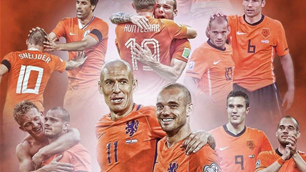THERE was just one regret from Holland coach Bert van Marwijk after the most brutal World Cup final in history.
His team did not win. That was it. After 14 bookings, five of which went to Spain while two of Holland's added up to a red card for John Heitinga, there was no apology for Holland's rough-house tactics which were designed to break up Spain's rhythm and tempo.
There were just some barbs aimed at referee Howard Webb by Holland's disappointed players and a parting shot from Van Marwijk which summed it up: "I would have loved to have won the match even with not so beautiful football."
And there you had it. The modern sporting world. The one which lives by the old maxim of legendary American football coach Vince Lombardi: "Winning isn't everything, it is the only thing."
Which is all very well and it made for a dramatic final - except that an estimated one billion viewers tuned in, many impressionable schoolchildren watching their heroes who they will be emulating out on the playing fields over the coming months.
As an example, football's most prestigious occasion sent out precisely the wrong message.
Let us not exonerate Spain. They did their fair share of fouling, 19 to Holland's 28.
Let us not exonerate Webb either, even if it was the toughest of matches to control. Nigel de Jong's karate kick to the chest of Xabi Alonso and Mark van Bommel's persistent recklessness both warranted red while Carles Puyol's rugby tackle on Arjen Robben when he was bearing down on the Spanish goal should have produced a second yellow card which would have seen the Spanish defender sent off.
Of course emotions run high in World Cup finals. Mistakes are made. In hindsight Webb will wonder if he was a shade trigger-happy in going for his cards, although a case can be made for them all on video replays.
Yet when the disappointment of Holland's fans has cleared there is one unforgivable charge which Van Marwijk one day will have to answer.
In 120 minutes of action in which his team's instructions were to knock Spain out of their imperious rhythm, apparently by fair means or foul, he sullied the reputation of Dutch football.
Before this final, history was kind to Holland. Mention Dutch football and you immediately thought of Johan Cruyff and Marco van Basten and 'Total Football' and 'Clockwork Orange.'
Yes, you thought of disharmony in the camp which too often had made them the game's underachievers but the abiding memory was of glamour and style.
It had taken decades to earn that reputation. In less time than it takes to finish a decent dinner it had been devoured by Van Marwijk's desperation to lift football's greatest trophy.
By any measure that cannot be worth it. And for all those who say FIFA should make an example of them, perhaps by a fine for ill-discipline, then nothing could be worse punishment than the loss of that reputation.
But what of the winners? Where will Spain feature in the pantheon of World Cup winners?
We will remember the automatic fluidity of their midfield where Xavi, Andres Iniesta and Alonso were the epitome of Spain's beautiful football.
Yet they scored just eight goals, the least by a winning nation since Brazil in 1994 and England in 1966, who both scored 11.
That does not suggest a team with the capacity to thrill. Not like Argentina in 1986, nor France in 1998 and not in the same ballpark as the 1970 Brazilians, still the greatest all-round thrill-makers in the history of the game.
By contrast, Spain were an aficionado's dream. A team who played with measured beauty, always neat and precise and whose passing was like vivid brush strokes, but who were also cautious and parsimonious at times when it came to flooding the opposing penalty area with attackers. Hence the reason they became the first team to win the trophy after losing their first match, against Switzerland.
There is no doubt, however, that Spain played the quality football at a tournament which was not over-blessed with that commodity.
Drama and controversy, yes, it had plenty of that. Such as Frank Lampard's disallowed goal against Germany which might yet see the FIFA dinosaurs embrace goal-line technology, Carlos Tevez's outrageous offside goal for Argentina v Mexico later the same day, Luis Suarez's notorious handball, Asamoah Gyan's missed penalty, the Jabulani ball, the love-them-or-hate-them vuvuzelas.
And a finale which saw former president Nelson Mandela make the briefest of appearances to symbolise the coming of age of the Rainbow Nation as a world player.
It's true, huge problems of poverty and crime remain but the unifying effect of this World Cup is not just in the imagination. It is real. Anyone who has witnessed the last five weeks here can see that.
The World Cup 2010 has enhanced the reputation of South Africa. By contrast for Holland, in the final analysis, it proved quite the opposite.
There were just some barbs aimed at referee Howard Webb by Holland's disappointed players and a parting shot from Van Marwijk which summed it up: "I would have loved to have won the match even with not so beautiful football."
And there you had it. The modern sporting world. The one which lives by the old maxim of legendary American football coach Vince Lombardi: "Winning isn't everything, it is the only thing."
Which is all very well and it made for a dramatic final - except that an estimated one billion viewers tuned in, many impressionable schoolchildren watching their heroes who they will be emulating out on the playing fields over the coming months.
As an example, football's most prestigious occasion sent out precisely the wrong message.
Let us not exonerate Spain. They did their fair share of fouling, 19 to Holland's 28.
Let us not exonerate Webb either, even if it was the toughest of matches to control. Nigel de Jong's karate kick to the chest of Xabi Alonso and Mark van Bommel's persistent recklessness both warranted red while Carles Puyol's rugby tackle on Arjen Robben when he was bearing down on the Spanish goal should have produced a second yellow card which would have seen the Spanish defender sent off.
Of course emotions run high in World Cup finals. Mistakes are made. In hindsight Webb will wonder if he was a shade trigger-happy in going for his cards, although a case can be made for them all on video replays.
Yet when the disappointment of Holland's fans has cleared there is one unforgivable charge which Van Marwijk one day will have to answer.
In 120 minutes of action in which his team's instructions were to knock Spain out of their imperious rhythm, apparently by fair means or foul, he sullied the reputation of Dutch football.
Before this final, history was kind to Holland. Mention Dutch football and you immediately thought of Johan Cruyff and Marco van Basten and 'Total Football' and 'Clockwork Orange.'
Yes, you thought of disharmony in the camp which too often had made them the game's underachievers but the abiding memory was of glamour and style.
It had taken decades to earn that reputation. In less time than it takes to finish a decent dinner it had been devoured by Van Marwijk's desperation to lift football's greatest trophy.
By any measure that cannot be worth it. And for all those who say FIFA should make an example of them, perhaps by a fine for ill-discipline, then nothing could be worse punishment than the loss of that reputation.
But what of the winners? Where will Spain feature in the pantheon of World Cup winners?
We will remember the automatic fluidity of their midfield where Xavi, Andres Iniesta and Alonso were the epitome of Spain's beautiful football.
Yet they scored just eight goals, the least by a winning nation since Brazil in 1994 and England in 1966, who both scored 11.
That does not suggest a team with the capacity to thrill. Not like Argentina in 1986, nor France in 1998 and not in the same ballpark as the 1970 Brazilians, still the greatest all-round thrill-makers in the history of the game.
By contrast, Spain were an aficionado's dream. A team who played with measured beauty, always neat and precise and whose passing was like vivid brush strokes, but who were also cautious and parsimonious at times when it came to flooding the opposing penalty area with attackers. Hence the reason they became the first team to win the trophy after losing their first match, against Switzerland.
There is no doubt, however, that Spain played the quality football at a tournament which was not over-blessed with that commodity.
Drama and controversy, yes, it had plenty of that. Such as Frank Lampard's disallowed goal against Germany which might yet see the FIFA dinosaurs embrace goal-line technology, Carlos Tevez's outrageous offside goal for Argentina v Mexico later the same day, Luis Suarez's notorious handball, Asamoah Gyan's missed penalty, the Jabulani ball, the love-them-or-hate-them vuvuzelas.
And a finale which saw former president Nelson Mandela make the briefest of appearances to symbolise the coming of age of the Rainbow Nation as a world player.
It's true, huge problems of poverty and crime remain but the unifying effect of this World Cup is not just in the imagination. It is real. Anyone who has witnessed the last five weeks here can see that.
The World Cup 2010 has enhanced the reputation of South Africa. By contrast for Holland, in the final analysis, it proved quite the opposite.
Copyright (c) Press Association
Related Articles

Watch! Referee scores goal in Holland

Wesley Sneijder reveals amazing custom shirt













